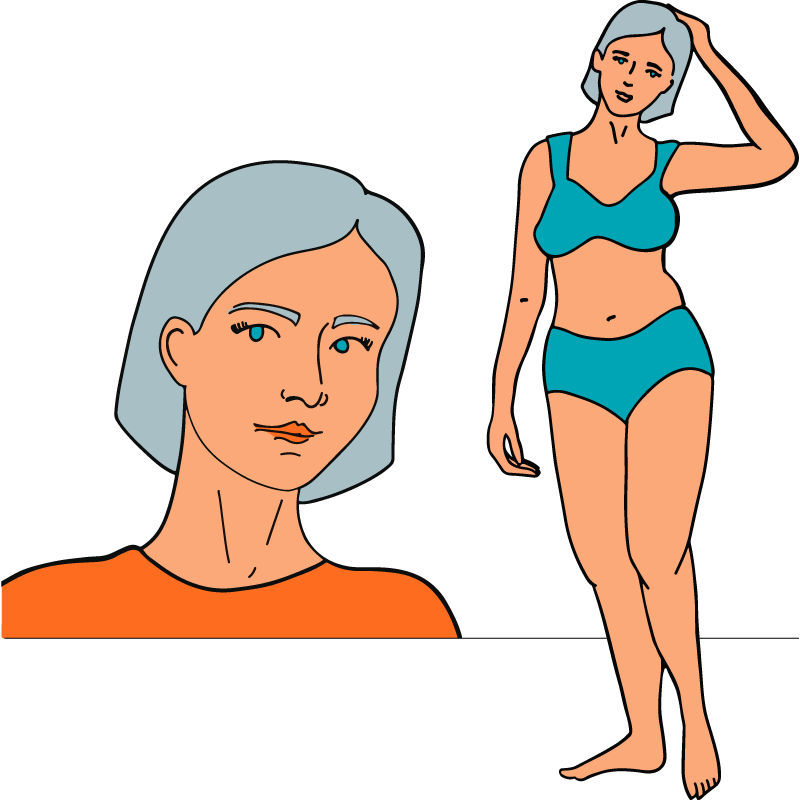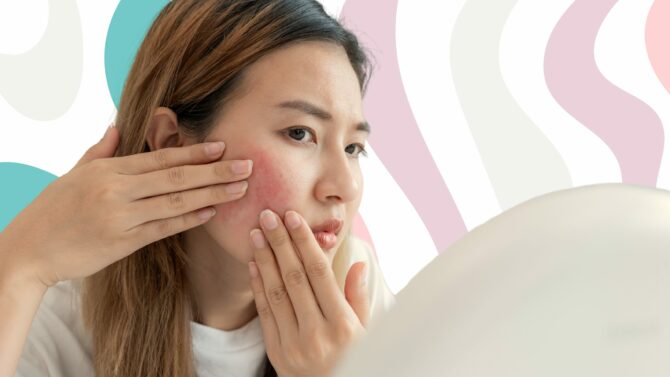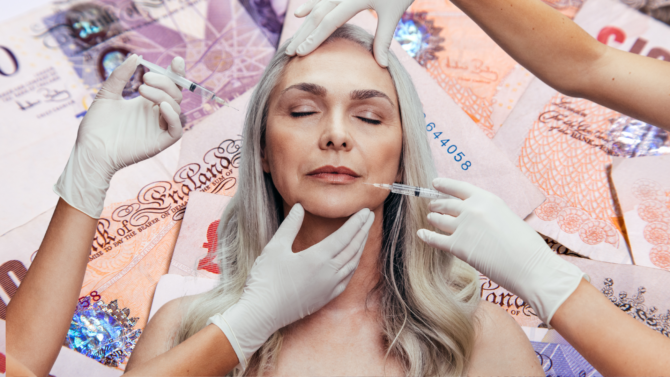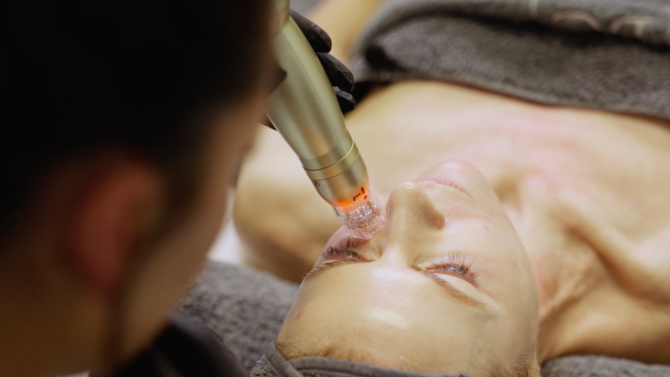What is rosacea?
Rosacea is a skin condition which shows up as a red flush across the central areas of the face, i.e. the forehead, nose, cheeks, and chin. It can look like a light blush, but in more severe cases it can be angry, red, and accompanied by spots. It is more often seen in women, particularly middle-aged women, but in men it tends to be more severe. Rosacea is known as ‘the Curse of the Celts’ because it is most common and most obvious in those with pale skin. A cosmetic dermatologist will tell you that rosacea is a chronic condition that mainly affects the convex surfaces of the face — the cheeks, chin, nose, and forehead. Although the scientific nature of rosacea is a matter of debate, recent research points to it being an inflammatory response by the body’s immune system in reaction to neurovascular (that’s nerves and blood vessels) dysfunction.
What causes rosacea?
Although rosacea is a pretty common affliction, science is yet to develop a full understanding of the condition. There’s lots of ongoing research, however, and in the last few years we’ve started to build a much clearer picture of what’s happening. Current theory goes that dysfunction in the nerves surrounding the blood vessels in the face results in an imbalance (possibly of neuropeptides, tiny molecules that nerve cells use to talk to each other, although this isn’t yet clear) which stimulates an immune response in the area, characterised by inflammation. Put more simply, something is upsetting the nerves around the tiny blood vessels in the skin and the result is the flushing and blushing that sufferers will know all too well.
Is rosacea caused by mites on the skin?
There is a kind of microscopic mite, called Demodex, which lives on the skin on our faces (they eat the dead skin, which helps to get rid of it), which is perfectly normal. But it seems that if you have an unusually high concentration of these mites, they may play a role in provoking rosacea. I’m using these vague terms because the relationship between Demodex and rosacea isn’t particularly clear, but it is something that is being studied, so it may become clearer in future.
What does rosacea look like?
The tricky thing with identifying rosacea is that it shows up in many different forms. Apart from making the face look flushed, rosacea can show up as tiny raised red bumps or acne-type pustules, or an increased number of thread veins on the face. Add to that the way it tends to come and go, and you can see why it is tricky to spot, and why it isn’t diagnosed as quickly or as often as it should be.
Rosacea can be very mild, where your skin just has the odd tendency to flush — or it can be very obvious and persistent. It tends not to be obvious before the age of 30, and it tends to get worse the older you get. If rosacea is left untreated, it can thicken the skin, particularly on the nose, a condition called rhinophyma.
One of the odd things about rosacea is that it can make the skin feel rough and dry, rather than oily — people tend to expect the latter when they see spots. Rosacea is widely under-diagnosed, not least because not all rosacea looks the same.
What makes rosacea worse?
If this is starting to sound familiar, you will already know that it doesn’t take much to make rosacea kick off. Common triggers include many of the normal things that many people enjoy, such as coffee, alcohol, spicy food, hot baths, and particularly sunshine. Surveys show that 85 per cent of people who struggle with rosacea find that UV light triggers the condition; yet another reason for wearing a product with SPF every day.
Is rosacea worse in heavy drinkers?
If the redness of rosacea settles around the nose, it’s a look that’s — unfairly — associated with hardened drinkers; in fact, drinking too much alcohol doesn’t cause the redness, but it does dilate the blood vessels that are there, so it makes an existing problem more obvious.
What can be done about rosacea?
As anyone who struggles with rosacea will know, it’s not just maddening to have a red flush across your face, but those flushed capillaries can settle in and become persistently obvious thread veins, and the weathered look that those veins give to a face does make it look older.
In order to try and manage rosacea you can:
- Wear sunscreen
- Try skin-calming skincare products
- Avoid face scrubs, and products with fragrance (it is often described as ‘parfum’ in the list of ingredients on the packaging)
- Observe what triggers your rosacea (e.g. caffeine, or spicy food) and avoid it
- See a dermatologist for specific, prescription-strength skincare to treat rosacea
- Try tweakments that reduce redness in the skin
Is rosacea contagious?
No, rosacea is not contagious. It is a skin condition, not a disease. You can’t ‘catch’ it nor pass it on to someone else.
Is rosacea genetic?
There is a genetic component to rosacea. If your parents suffer with it, it is more likely that you will, too, though the condition is also affected by the way you live and the environment you live in.
What skincare works for rosacea?
Ideally, you would find a dermatologist to help you with this, because not everyone with rosacea responds to the same products in the same way. But using the right skincare can help you manage rosacea, and backing this up with redness-reducing light treatments can minimise the appearance of the rosacea. They’re not a permanent fix, so the redness will come back, and you’ll need to have treatment again, but least you’ll get some respite.
If your skin is prone to flushing, you may be hesitant to use products on it, in case it makes them worse, but with rosacea, you need to take action. Gentle cleansing and using a moisturising sunscreen daily is a must. It is worth trying the sort of products that are called ‘anti-redness’ and ‘calming’, particularly ones from ‘doctor’ ranges such as Epionce, Neostrata, SkinMedica, PCA Skincare, iS Clinical, ZO Skincare and Jan Marini. Ingredients to look for include niacinamide, which has an anti-inflammatory action and which also helps strengthen the skin barrier.
Can I use make-up to hide rosacea?
Yes, make-up can be used to camouflage rosacea. Try to choose products that are free from fragrance and which are gentle on the skin, such as mineral make-up, or products designed for sensitive, reactive skin. But do think of treating your rosacea, rather than just covering it up, as there are many products and treatments that can help.
Treating rosacea with skincare and light treatments
Cosmetic doctors concentrate on repairing the damaged skin barrier with specialized skincare and quelling redness with high-tech light treatments. Dr Mervyn Patterson of the Woodford Medical Clinic has a special interest in rosacea. He is keen on the Epionce Lytic skincare range, and backs this up with intense pulsed light (IPL) treatment, which reduces redness in the skin by destroying the tiny thread veins that appear on the skin’s surface; fewer thread veins means that, when the skin does next flush red, it will be less obvious. It’s the sort of treatment that’s uncomfortable rather than acutely painful, and it’s very effective.
‘The best option is to have a course of IPL or laser treatment to reduce thread veins,’ says Dr Patterson. ‘Nothing in the past decade has emerged which is better than this for reducing the number of blood vessels in the skin — no skin cream can actually remove blood vessels from the face.’ A course will mean three or more treatments, depending on how severe your problem is, done a month apart.
Can a dermatologist help my rosacea?
Yes, the expert advice that you will get from a qualified dermatologist will certainly help you to get your rosacea under control. A dermatologist will analyse the type of rosacea that you have and prescribe specialised skincare products and treatments that should help you to manage the condition. Also, they will monitor your progress, so that if particular treatments or products aren’t doing the trick for you, they can adapt your regime to find something more effective.
Dermatologists may also prescribe antibiotics to reduce the inflammation that goes along with rosacea, or beta-blockers to reduce the flushing. If you have untreated rosacea that has developed into rhinophyma, where the nose becomes swollen and bulbous, this can be treated surgically by shaving down the excess skin, to restore the nose to its normal shape.
How much does treating rosacea with IPL cost?
This type of treatment costs around £150–250 per session, depending on the type of IPL machine that is used. You will need more than one session, depending on the extent of your rosacea. If you only have mild flushing, a couple of sessions may be enough to bring it under control for a few months.
Does laser work for rosacea?
Yes, when carefully used, laser also works well to reduce redness by destroying the pigment within thread veins, which is then cleared away by the body. Laser treatment is usually more expensive than IPL; expect to pay around £300 per session, though of course this depends on the extent of the area that you are having treated.
Does LED light treatment work for rosacea?
Treatment with an LED red light system can also help rosacea, though not as directly as zapping the thread veins with laser or IPL. A course of sessions of red LED light therapy and reduce inflammation in the skin and strengthen the skin barrier by improving the production of collagen and hyaluronic acid in the skin. You could also try using a home LED mask. These offer less intensive treatment than a professional LED system, so you need to use them more often, but with persistence, they will certainly give results.
How does a ‘cool laser’ work to reduce skin redness?
Most lasers work by creating heat on the surface of the skin, but others work by using a gentler wavelength of light that targets redness in the skin. The light breaks up and disperses the red blood cells — which are what is causing the redness on the surface of your face — without damaging the rest of the skin. So it is more comfortable than ‘normal’ laser, though it may take more than one session to bring redness under control, particularly if your skin redness is persistent. This type of treatment costs from £150 per session.







 The Tweakments Chatbot
The Tweakments Chatbot